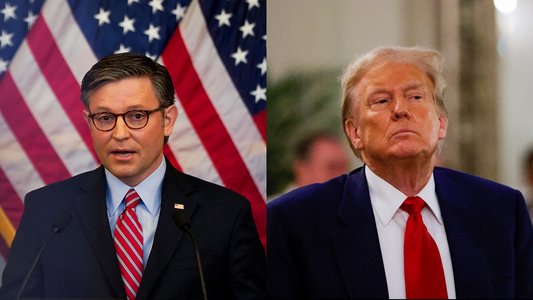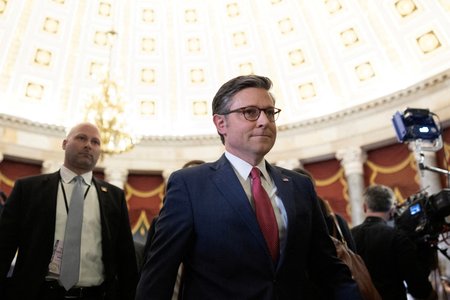Notice: Transcripts are machine and human generated and lightly edited for accuracy. They may contain errors.
MS. IFILL: On Capitol Hill –
Rep. Louie Gohmert (R-TX) : I don’t want rationed care.
MS. IFILL: – a vigorous effort to roll back one of the administration’s signature accomplishments.
REP. JOHN BOEHNER (R-OH) [Speaker of the House]: Our goal is to stop the job destroying health care bill.
REP. PAUL RYAN (R-WI): What does this bill ultimately do when you really look at it all? This bill blows a hole through the deficit.
IFILL: On the House side they voted to repeal healthcare this week, which doesn’t mean healthcare will be repealed. And Republicans said the law will kill jobs, but Democrats said it won’t. In other words, it was a debate that took us through the political looking glass again. First, to the jobs claim. Did we ever figure out who was right and who was wrong about whether this indeed is a job killing healthcare law, Doyle?
MR. MCMANUS: Well, first of all, Gwen, this is the new civil Washington. It’s not a job killing law. It’s a job crushing law.
MS. IFILL: That’s right. Job crushing. So much kinder. Destroying. Yes.
MR. MCMANUS: Destroying our jobs, squishing law. But to answer this substantive question, no, not really. The most frustrating thing about this debate was each side using those old talking points that we heard all last year. And if anything, they’ve gotten further apart on what the facts are.
Now, on is this a job killing law or not, the problem is there are too many moving parts in the American economy to come up with an easy, simple answer on that. Three quick parts of it: okay. It imposes new costs on businesses, so yes. At the margins some employers will go slower or not hire some people. You can think of it as a little bit like a raise in the minimum wage. The same effect, but does it kill the economy? No.
The second thing it does is it will give more people the freedom to decide to retire earlier, to reduce their hours, to not hang on the jobs that they’re only keeping because they need the health insurance. There was a debate over does that mean a loss of jobs? Well, no. It actually means people leaving the labor force that could mean more jobs for other people. It’s hard to get through that in the net.
Finally, if you talk to economists, and especially optimistic Democratic economists, they’ll tell you that eventually a good healthcare system will produce a more efficient, productive economy because, A, people will be healthier; B, it will be more efficient. People won’t be hanging on to jobs they don’t like or that they’re no good at. They’ll be able to move. Entrepreneurs will be able to go out on their own. That should produce – over the long run – a more efficient economy and more growth.
MR. WESSEL: Look, the Republicans are pushing this because they believe that the healthcare bill is truly unpopular with the people. And there’s some evidence for that in the polls. Is that – are they taking a wise bet, do you think?
MR. MCMANUS: We don’t know because that really is going to depend on how this plays out. But it’s worth taking a close look inside those numbers on what they call the wildly unpopular bill. The Republicans are right. If you ask people straight up, do you want to repeal the bill or keep the bill, you get about an even split. It’s roughly 50-50. Sometimes it’s up this way, sometimes it’s up that way. But if you take that half of the country that says, yes, let’s scrap this bill and ask them what’s your beef with it, almost a third of those people don’t like the bill because it didn’t go far enough. They’re liberals criticizing it from the left so they’re not actually in the same camp. So that’s kind of a deceptive number. In the end it may or may not be as unpopular as that.
MR. BAKER: What about the deficit? You know, we heard on the floor of the House they say this is going to blow a hole in the budget. Does it? I mean, the Democrats say it’s the other way around.
MR. MCMANUS: That’s right. The Democrats actually say it ends up –
MR. BAKER: Ends up saving –
MR. MCMANUS: Reducing the deficit, saving money.
MR. BAKER: Right.
MR. MCMANUS: And that one, Peter, really depends on whether you are an optimist or a pessimist because the biggest piece of cost savings over the next 10 years and the 10 years after that is if this new plan helps bring Medicare costs under control, helps make Medicare more efficient and if you think Congress will actually bite the bullet and do that, which will mean in some cases telling people they can’t get all the Medicare they want, there could be huge savings. But if you think Congress will wimp out, there won’t be.
MS. TUMULTY: So what next? Was this just hollow symbolism? As soon as the vote was over with –
MS. IFILL: What? Hollow symbolism in Congress? (Laughter.)
MS. TUMULTY: Well, demagoguery. So as soon as the vote was over with though, Mitch McConnell says, and now we’re going to have the same vote in the Senate and Harry Reid’s office says, not likely. Does this go anywhere from here?
MR. MCMANUS: It does, Karen. It was symbolic, but I don’t think it was hollow symbolism. I think it was meaningful symbolism –
MS. IFILL: Okay.
MR. MCMANUS: – in the sense that this was –
MS. IFILL: Now tell us what that means.
MR. MCMANUS: Well, this was the first salvo in what’s going to be a year long, probably two-year long Republican guerrilla war against the healthcare plan. And they’re going to fight it two ways. They’re going to take pieces of it and try and defund them or prohibit them. There’s even a proposal to prohibit the government from defending its case in the courts when the constitutionality comes up. That’s probably not legal, but they’re going try and take funding away from every piece of it they can and throw sand in the gears. And then, the other things that Republicans – the House leadership instructed its new chairmen to do was to sit down and produce finally a real Republican healthcare bill that does all kinds of good things, that lets kids stay on your plan until they’re 26, that – you know –
MS. IFILL: All the popular stuff.
MR. MCMANUS: All the popular stuff, but lowers costs, has no individual mandate. Now, if they can pull that off, that will be a miracle because nobody’s been able to figure out how to do it. But if they can do it, they’ll deserve every reward they get.








